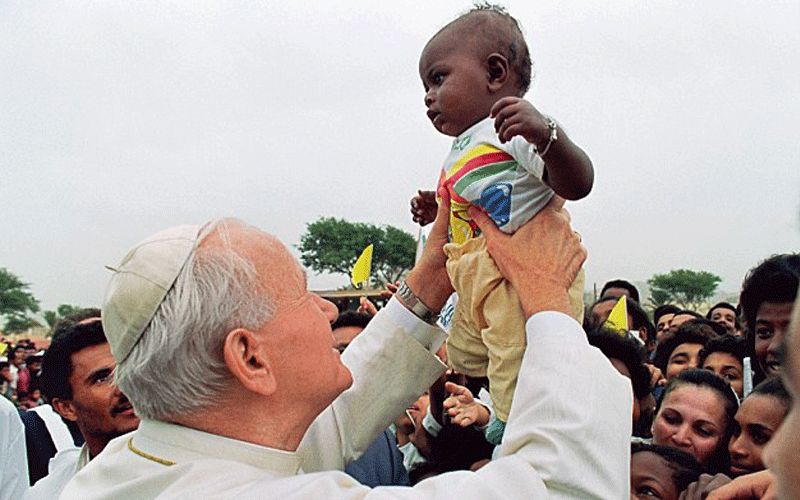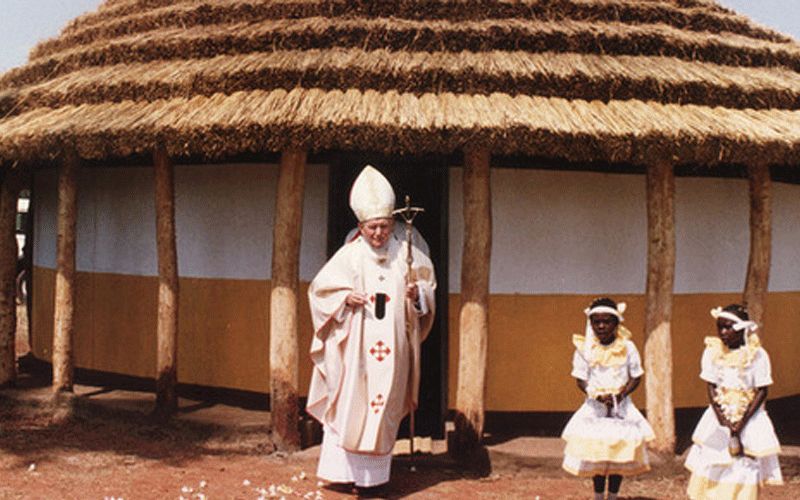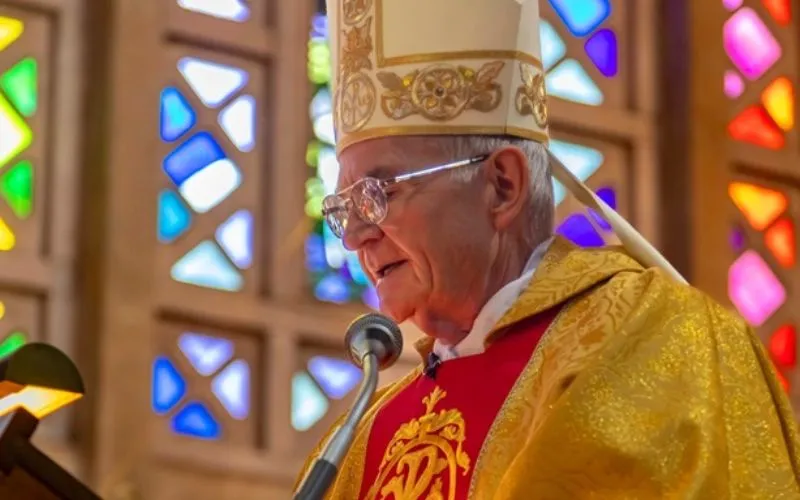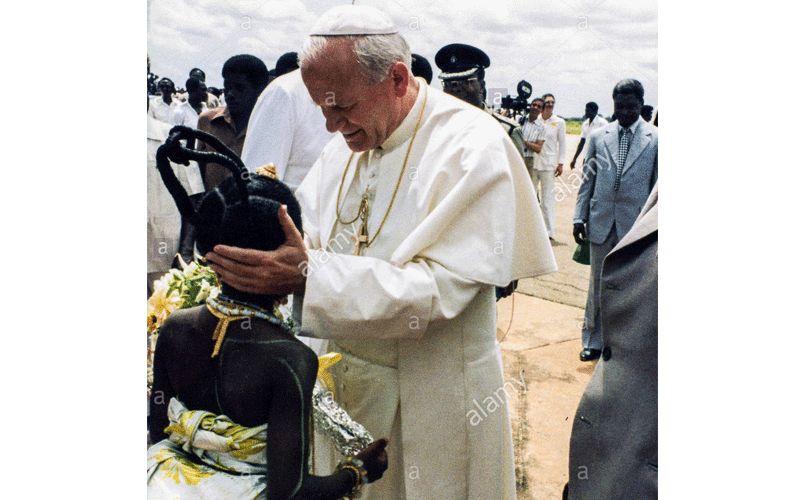Many other people shared their memories of St. Pope John Paul II on his centenary birthday, which is being celebrated across the globe Monday, May 18.
Born in Poland in 1920 and named Karol Józef Wojtyła, he was made a Cardinal in 1967. In October 1978, he became the first Pope from a Slavic country and the first non-Italian Pope in 455 years. He took the name of his predecessor Pope John Paul I whose pontificate lasted only 34 days.
Having made 16 pastoral trips across 38 countries in Sub-Saharan Africa during his 27-year pontificate, St. John Paul II is so far the most travelled Pope on the African continent.

On his maiden trip to Africa in 1980, he is remembered urging Ghanaians to promote the dignity of individuals as well as to uphold equality and justice.
(Story continues below)
“The Church asks you to bring the influence of the Gospel and the presence of Christ into every human activity, and to seek to build a society where the dignity of each person is respected and where equality, justice and freedom are protected and promoted,” he said in a Homily in Accra.
In 1982, during his pastoral visit to Nigeria, Pope John Paul II urged reconciliation between Christians and Muslims, saying, “All of us, Christians and Muslims, live under the sun of the one merciful God.”

Fr. Patrick Alumuku, a Nigerian national who worked closely with Pope John Paul II for 12 years at the Africa Service of Vatican Radio remembers the Pope who “loved Africa.”
“He was called ‘The Pope who loves Africa’ by the Italian press because of his many trips to our continent,” says Fr. Alumuku, currently the Director of the Abuja-based Catholic Television of Nigeria (CTV).
He adds, “He's fondly remembered all over the continent. He also led to the growth of the church on our continent and we thank God for his life, his example and his leadership. And he remains a model for evangelization for the entire African continent.”
The CTV Director remembers a leader who “came to call for a new evangelization in Nigeria and that call actually led to a new momentum in the missionary activity of Nigeria.”
“It also gave impetus to a desire for missionary groups, possibly for Nigerians, to become missionaries to themselves and to be missionaries outside of their country. And that was the beginning of the great movement for vocations in our country. I worked here for twelve years, and afterwards I was sent to study in Rome and also worked for Vatican Radio,” the Nigerian Cleric who holds a doctorate in Social Communications from the Gregorian University in Rome says.

In his testimony about St. John Paul II shared with ACI Africa, the President of the Symposium of Episcopal Conferences of Africa and Madagascar (SECAM), Philipp Cardinal Ouédraogo, celebrates a most-travelled servant of God
“He is a great Pope, an authentic Pastor and Witness of Jesus Christ,” says Archbishop Ouédraogo.
The Archbishop of Ouagadougou in Burkina Faso explains the “greatness” of St. John Paul II, “First of all, by his personality, he was a man of God, imbued with God who was not afraid to announce the Gospel to the little ones as well as to the great ones of this world. He made, it seems, 104 pastoral journeys and bequeathed to the Church 14 Encyclicals, which constitute precious teachings on the faith, the Church and the world.”
He continues, “In my capacity as President of the Symposium of Episcopal Conferences of Africa and Madagascar (SECAM), on behalf of the African Episcopate, we must pay a vibrant tribute to him for his many pastoral journeys on the African Continent and his precious Post-Synodal Exhortation Ecclesia in Africa.”
Citing personal experiences with St. John Paul II, Cardinal Ouédraogo says he interacted with him both as a seminarian and as a Bishop.
“While I studied in Rome between 1979-1983, I lived with great pain the attack on the Pope in St. Peter's Square,” the 75-year-old Cardinal says and adds, “I consider him a true father and a guide for my life.”
From 18 to 24 November 2019, the President of SECAM says he hosted and presided over the 4th Pan-African Congress of Divine Mercy in Ouagadougou whose theme was “Divine Mercy, a grace for our time.”
He adds in reference to the saint who he considers as the pioneer of Divine Mercy, “In this we can see a convergence and a deep communion between Saint John Paul II and our Pope Francis for whom mercy is the vibrant heart of the Gospel.”
“So, Saint John Paul II, pray for the Church and the world that you have loved and served so much,” the Burkinabe Cardinal says in his final remarks to ACI Africa and thanks the various media outlets that are facilitating the marking of “the centenary of the birth of Pope John Paul II with a golden stone.”
On his part, Cameroonian Martin Jumbam, a Catholic Journalist, Translator and Interpreter remembers St. John Paul II as spiritual leader who left a mark in the country’s education as well as health sector.
Sharing personal memories of Pope John Paul II’s two visits to Cameroon in 1985 and in 1995, Martin Jumbam says, “When Pope John Paul II first visited Cameroon in 1985, I was not yet active in the Catholic media and I observed the events more from the sidelines than from the inside.”

The Pope’s pastoral visit to Cameroon saw the establishment of thriving learning institutions and health facilities, Martin Jumbam says and adds in reference to the 1985 Papal visit to his country, “I recall the Holy Father's meeting with Catholic intellectuals in Cameroon's capital Yaounde. Here, the Holy Father urged them to be more active in finding solutions to the problems of their society and not wait for others to come from outside and do it for them.”
He adds, “At the meeting, the Pope called for the creation of Catholic institutions of higher learning and that the Catholic University of Central Africa, among other institutions, came as a response to that appeal. It has since earned a solid reputation for its pursuit of intellectual excellence and integrity in academic matters.”
“In fact, it is Jesuit-led and stands head and shoulders above every other institute of higher learning in Cameroon, be it public, private or confessional,” Martin Jumbam says in his interview with ACI Africa Monday, May 18.
The Doula-based Catholic journalist who also met the Holy Father on his second visit to the West Africa country in 1995 says, “From Pope John Paul II’s two visits to Cameroon, our people, and people in surrounding countries, have reaped many benefits, both spiritual and material, all for the greater glory of God Almighty. Saint John Paul II, pray for us.”
Christian Cardinal Tumi, Archbishop Emeritus of Douala in Cameroon says that St. John Paul II loved the Church, especially the people of God in Africa.
“In Africa, for example he promoted enculturation, bringing into the Church African cultures that are in agreement with the gospel,” The Cameroonian Cardinal says.
One of the setbacks that Christian Cardinal Tumi faced when Pope John Paul II appointed him Archbishop of Garoua, he says, was having few priests to serve in the local church, a challenge that he says the Pope solved immediately.
“I wrote to the Pope to tell him about this challenge and he sent me priests from the Archdiocese of Milan to help in my pastoral ministry. So, every year I received 6 priests from Milan sent by the Pope to help the Archdiocese of Garoua,” the 89-year-old Cardinal says and adds in reference to St. John Paul II, “The Pope also supported the local Church in the building of schools, hospitals and Parishes in Garoua.”

Meanwhile, in a letter shared with ACI Africa, Charles Besigye, A Ugandan Focolarino refers to St. John Paul II as “the Pope of the People.”
“Your Holiness JP II,” Charles writes and continues, “If you were still here on earth with us, we would have shared a Cake on your 100th Birthday. All the same we celebrate you here on earth as you do in heaven with the saints. I thank God who made me know and meet a Saint in the making on three occasions that have marked my life.”
The Rome-based member of the Focolare Movement goes on to narrate his first meeting with Pope John Paul II during a festival that brought together more than 16,000 youth from across the globe in 1990 at Palaeur Studium in Rome.
“He encouraged us to build a united world as the title of the meeting suggested. The only thing I remember today was his smiling face as he addressed us,” he says.
At the World Youth event that was held in Rome in 2000, Charles recalls a remarkable night that millions of youth across the world had with the Pope.
“His love for young people was so great. I Had accompanied a group of more than 10 young people from Kenya and we happened to be privileged to occupy the first long rows so we could see and hear him directly on the stage,” he says.
Charles who was also present at Pope John Paul II’s funeral in St. Peters Square in April 2005 says, “It was incredible to see how many people were present and grieved of the loss of a Pope that loved people so much. We had carried banners written ‘Santo Subito’ (Saint immediately) …and we raised our voices and banners acclaim in Santo Subito as we accompanied him to rest.”
“I am full of gratitude to God who gave us the gift of John Paul II who left us with a legacy of his Magisterium that the Church and the society will always draw from to nourish current generations and those yet to come,” Ugandan-born Charles says and adds, “We call on you St. John Paul II to help us keep faith and hope in this trying moment of the COVID-19 Pandemic. Happy Birthday!”















